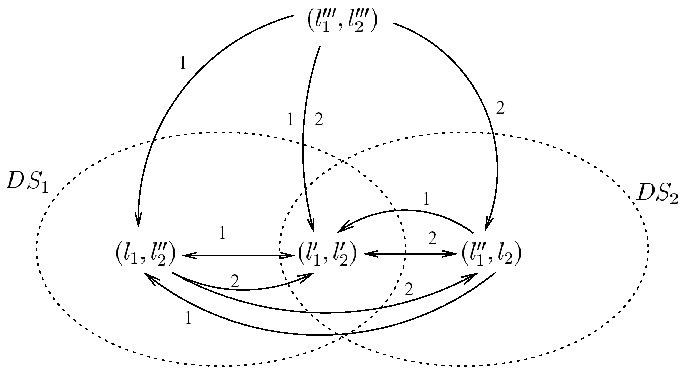| Marek Sergot | |
| Other academic members: | |
| Krysia Broda | |
| Ian Hodkinson | |
| Chris Hogger | |
| Bob Kowalski | |
| Frank Kriwaczek | |
| Fariba Sadri | |
| Francesca Toni | |
The Department has a long-established international reputation for pioneering developments in logic as a computational and representational formalism in artificial intelligence, databases, and software engineering. The research encompasses logic programming extensions, knowledge representation formalisms, automated reasoning, machine learning, and the theory and applications of classical, non-classical and modal logics.

An example of a deontic system and its generated frame. From "Extending interpreted systems with some deontic concepts", by Lomuscio and Sergot.
Several members of the group are working in the area of logic-based multi-agent systems, with particular emphasis on the development of abductive and constraint logic programming applied to planning, agent reactivity, and communication. There is also work on the creation and analysis of programs for teleo-reactive robots.
In databases, the main activity is in active and deductive databases and in temporal database. These are applied in particular to the integration of heterogeneous and distributed information sources and the associated update and revision mechanisms. One important source of problems driving these developments is bioinformatics, where a number of projects are being undertaken in collaboration with the life science departments and units of the School of Medicine. Several members of the group belong also to the Computational Bioinformatics Group.
In the area of
machine learning, work encompasses the theory and applications of inductive
logic programming, intelligent adaptive agents, and natural language
learning.
Applications of machine learning in molecular biology are a major
activity in the Computational Bioinformatics Group.
There is also interest in using neural networks to represent logic programs as background knowledge in neuro-symbolic systems and in extraction of knowledge learned after training such systems.
There is substantial activity within the group on theoretical investigations in algebraic, modal and temporal logic, and related logical systems, on technical issues in applied multi-modal logics and their automation, particularly for logics associated with practical reasoning (temporal, epistemic, deontic, and action logics), and in finite and infinite model theory.
There is also work on Compiled Labelled Deductive Systems as a uniform framework for presenting non-classical logics, such as resource logics, normal conditional logic and some non-monotonic formalisms, and also on automating the presentations of such systems using tableaux and related methods.
Several members of the group have a long-standing interest in the role of computational logic for modelling and implementing rules and policies governing agent interactions, including human interactions, interactions between artificially intelligent agents, and human-computer interactions. Formal theories of argumentation are being investigated, both as a theoretical device in the formalisation of non-monotonic reasoning, and for application to practical problems, such as those arising in legal reasoning, in negotiation, and in conflict and dispute resolution in multi-agent systems. There is research into using Prolog as a formalism for representing various program descriptions found in the UML so that consistency between different parts of a system design can be checked.
Work continues on the representation of laws, regulations, rules, policies, technical standards, codes of practice, and contracts. Research on the logic of action, agency, norms, and institutions is aiming to develop computational theories of complex concepts such as right, duty, entitlement, responsibility, authorisation, authority, and delegation.
Applications are
found in modelling multi-agent societies, in e-commerce (e-business) and
e-Government, and in aspects of computer security, particularly those
concerned with authorisation policies and the specification of virtual
organisations and enterprises.